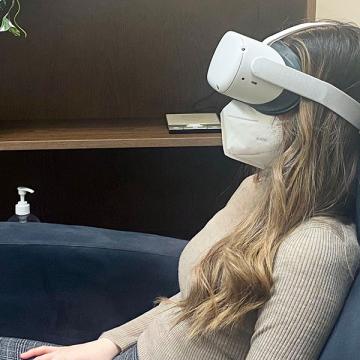
Virtual reality innovation in exposure therapy
What do you think of when you hear “virtual reality”? Virtual reality...
UBC Health is hosting Health After 2020 dialogue sessions throughout the year to highlight the work of eight interdisciplinary teams at UBC who received funding through the Health After 2020 program. The program enables researchers to engage in interdisciplinary and cross-institutional projects that support, challenge, and improve health producing systems. These collaborations are intended to respond to the broad effects of the COVID-19 pandemic and further our understanding of the determinants and experience of health and wellbeing.
Health inequities abound across many sociodemographic groups, including those based on sex and gender. Sex/gender differences exist in disease etiology, manifestation, progression, and treatment. The Canadian Institutes of Health Research (CIHR) and the National Institutes of Health (NIH) have mandated the inclusion of sex in clinical trials and research; however, whether these mandates and initiatives will improve women’s health is a matter of debate.
Female-specific experiences greatly influence health, but studies on female-specific experiences are scarce. Studying sex differences exclusively will not address how female-specific experiences can impact health, which begs the question of whether NIH’s sex as a biological variable and CIHR’s sex and gender-based analysis go far enough. Women’s health is not just influenced by biology but also includes how gendered experiences influence health outcomes. Studying different experiences among females will lead to new treatments for them but may also give us clues for new pathways to investigate across sexes and genders.
In order to be better prepared for current and future health crises, such as COVID-19, there needs to be more research on women’s health. This dialogue session will outline why science needs to define and value women’s health by demonstrating that it is a distinct field of research.
Speakers
Speaker bios are available on the March 18 dialogue session page.
Save the dates and register early for the next three sessions in our dialogue series. Full descriptions and a list of speakers will be available in the coming months on the dialogue sessions page.
Speakers include Dr. Trisha Chakrabarty, Assistant Professor, Department of Psychiatry, Faculty of Medicine
Friday, April 8, 2022
11:00 am - 12:00 pm
Early registration
Speakers include Dr. Rita McCracken, Assistant Professor, Department of Family Practice, Faculty of Medicine
Wednesday, April 27, 2022
12:00-1:00 pm
Early registration
Speakers include Dr. Marianne Vidler, , Assistant Professor, Department of Obstetrics and Gynaecology, Faculty of Medicine
Wednesday, May 11, 2022
12:00-1:00 pm
Early registration
Posted February 14, 2022